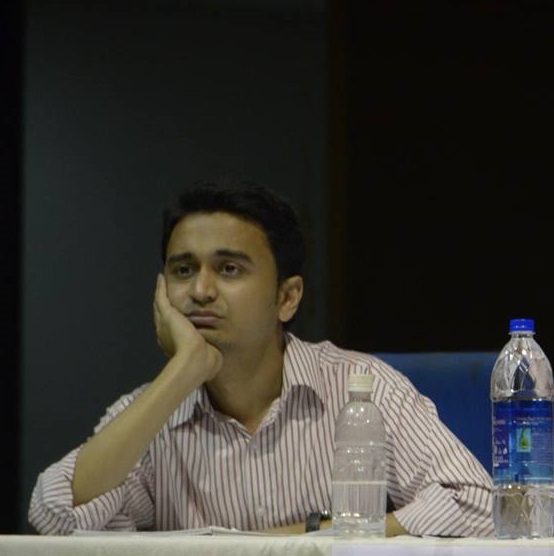Agnidipto Tarafder, Co-Founder of CLATapult, writes about how one should prepare for CLAT for studying LLM from NLU. He has done his LLM from West Bengal National University of Juridical Sciences (NUJS) and formerly tutored at IDIA-Increasing Diversity by Increasing Access to Legal Education.
 How does one prepare for CLAT LLM? How does one kick-start a start-up? When Ramanuj da (to whom I owe a great deal since few seniors take the trouble to teach you how to type) asked me to write on these topics a few days earlier, what I had to say to him is what I am going to tell you now. If these are questions that you want answers to, you’re asking the wrong questions to the wrong person. What I can tell you, however, is this:
How does one prepare for CLAT LLM? How does one kick-start a start-up? When Ramanuj da (to whom I owe a great deal since few seniors take the trouble to teach you how to type) asked me to write on these topics a few days earlier, what I had to say to him is what I am going to tell you now. If these are questions that you want answers to, you’re asking the wrong questions to the wrong person. What I can tell you, however, is this:
How do you prepare for an exam when everything is going wrong in life, when all hell has broken lose? How do you start a business, without money, resources and zero business experience? If you feel that any of these questions interest you, and you might be benefitted by the knowledge of my mistakes, and you’re welcome to read on, though I offer no guarantees of quality advice
How does one prepare for CLAT LLM- Conventional Wisdom
The nature of the CLAT LLM exam has changed somewhat over the past few years. Initially, a paper having both an objective and a subjective component, it is uniformly objective now in its current avatar. The question cover all compulsory law subjects prescribed by the BCI, with an additional section on Constitutional Law and Jurisprudence. Though the syllabus is the same as that of the AIBE, the preparation requires a more in-depth study of the subjects.
I unequivocally recommend JG Ridall for Jurisprudence, and MP Jain / VN Shukla / JN Pandey (yes, this too. Exam preparation is not a good time for snobbery, I have learnt to my disadvantage) are all useful books to prepare from if you have the time. Since a lot of people take the decision to appear quite late in the day and hence are left with a little over a month to prepare, brushing up key concepts in Constitutional Law by referring to Madhav Khosla’s “The Indian Constitution” (thematically distributed, a beautiful read otherwise also) might be a good idea. Apart from these, the AIBE preparation material by Rainmaker and any standard CLAT LLM Guide (Universal’s is what I had used) should do the trick for all the other subjects- International Law, Labour Law, Administrative Law, Criminal Law and all the rest. These act to supplement the Constitution and Jurisprudence books as well, as they have extensive MCQ questions that follow each chapter, which helps test one’s preparedness. Also, I have heard from others who have taken CLAT LLM successfully, that Mani Tripathi (Jurisprudence) is better for preparation purposes, but I can’t give up my NUJS-snobbery in entirety, can I?
Did I study all of this before my LLM? Honestly, not even close!
Believe it or not, here’s my regimen. I coaxed the Constitutional Law professor at NUJS, Prof. Shameek Sen, to give me a rapid set of lectures on most of the broad themes and took extensive notes. (I cannot sell/lend/ donate them, as I do not retain them, sorry. You can ask anybody from 3rd year, NUJS to lend their class notes to you.) That and Madhav Khosla. I did Jurisprudence from Ridall all right, but couldn’t complete it all. Nor did I touch International Law (ironically, I did my LLM in International Law) or Labour law before appearing.
Oh, and having a breakup during exam preparations isn’t a smart idea, either, but a man must make mistakes to learn from them.
So how did I make it? Was it fluke?
Every risk becomes a calculated risk once it succeeds. I had a plan, and it was this. I studied Constitutional Law and Jurisprudence so well (also, I like both subjects. That helps. A lot.) that I could tackle almost anything thrown at me from those two subjects. If I didn’t know it, no chance the guy next to me did. Learning all the other subjects in a week didn’t seem feasible, so I picked the ones I found easier to learn and finished those off from the sources I mentioned. Quality, not Quantity. This was the secret ingredient in my noodle soup, so to speak.
Would I recommend this strategy to you? Absolutely NOT.
Unless you’re in dire straits. I was.
It’s all a learning curve- How failures make philosophers!
When in my final year of law school, I didn’t apply for placements in favor of litigation but didn’t have the tenacity to complete litigation internships. So I started a business with a friend from the neighborhood, of running a BPO/Call Centre. At my place. Ground floor. All-nighter. Selling ‘software’ to clients in the US. With a trade license and documentation, mind. Why? Because someone told me, it’s a “get-rich-quick” scheme, and I wanted to get rich, quick. The business plan he showed me was a work of art. Or fraud. It didn’t matter. It just seemed right. If only excitement could generate revenue! In less than two months, we were out of business, and I, on the verge of being thrown out of my house. I’m still friends with the guy, though. I’m the forgiving kind. I forgave him for the idea, and myself for falling for it.
Emerging Principle- Don’t try learning in a month, what people take years to master. I used this philosophy and avoided trying to learn Labour Law in 2 days, for instance. You can’t become Krishna Iyer in a day. Or a week.
Next stop, CLATapult. I had by then taught at almost all the major CLAT coaching centers in Kolkata at various points during my LLB student life. I taught all possible subjects, and several of my students at these places later became my juniors in college. This experience had to count for something, I felt always. My friend, Saiyed Anzar Abbas, whose room in the NUJS boys hostel (Room 219) had been our common room -cum- hunting ground for years, wanted to start a coaching center for CLAT aspirants in Bhubaneshwar. He asked me to jump on the bandwagon, and once Tanuj Kalia (of Lawctopus fame, and incidentally, our batchmate, friend and fellow huntsman) came into the fold, we went all guns blazing! The location shifted from Bhubaneswar to Kolkata, and other changes followed, but the game was afoot. We recruited teachers from among NUJS students to begin with, our USP being that only CLAT-crackers, i.e. students of premier national law schools shall teach at these centers.
We got off to a rocky start (to put it mildly!) but soon enough, and with more than a little help from our friends, (Arjun Gupta, Javedur Rahman and the like. The acknowledgement list is so long, it might appear as if CLATapult is a PR firm!) we managed to find two suitable centers in North and South Kolkata and started running. Every month we’d sit to figure out how to pay the bills for the next. We planned and failed, and failed and planned. The determination that was needed to carry on came mostly from Anzar while I was busy trying to rekindle a dying relationship. Yes, I was daft enough to think I could run a start-up and have a life, together. Matters got worse when this significant other decided to call it a day, effectively sending me into Devdas-mode for a substantial part of my last semester in college. Anzar, however, had neither given up on his dream nor, surprisingly, on me.
Emerging Principles- Don’t bother starting a business if you aren’t married to Claire Underwood. Also, when choosing partners for a start-up, the human qualities in people is what you look for, not their unique skill-sets only. Eg- I chose well, Anzar didn’t.
So this is the state in which I started preparing for CLAT, with the sole objective of getting through to NUJS. I couldn’t leave the city as that would mean giving up on CLATapult. Thus, it was kind of desperate, yes. And fortunately, with this level of pre-exam preparation, I got through. Despite the fact that all I scored in the 150 mark paper was 84, when the results came out, it seemed destiny conspired to get me a pretty crazy rank. AIR 4.
After the initial exultation, when I sobered down (which took a while), I realized that the rank was only that good because the All-India highest score was 90. 90/150! 60%! So most people appearing scored less than 50% in the paper. As a result, I got through just fine. And hence, I get to be CLAT-guru for eternity.
Emerging Principle- Sometimes you play well and lose. Sometimes you play rubbish and win. The trick is to keep playing.
Life in a Law School- Much the Same.
I got enrolled in NUJS for the One-Year LLM Course with a specialization in International Law. I did my LLB from NUJS, too. Same Professors, Same Courses. Mostly. With two astounding exceptions. Dr. Sandeepa Bhatt taught Air and Space Law, a compulsory paper in my second semester, which was pretty labour intensive, but worth the effort. I managed to learn that law extends to outer space as well, and now I know that the celebrities buying land on the moon can’t, strictly speaking, claim property rights there. (Law never fails to surprise you!)
The other was Prof. Uday Raj Rai. He taught one compulsory paper in each semester. Both the courses had convoluted names, but simply put, he taught Comparative Constitution and Jurisprudence. And how well he taught! He could blow the doors off the place! If you had an interest in the subject, and the willingness to delve a little deeper, he could unearth for your wonders! I remember him casually remarking in class (I suspect because of my interest in the subject, he liked me initially. And then I started coming in late, and things changed.) – “Mr. Tarafder, I find it illogical to sing such high praise of Maneka Gandhi. Most of that decision are obiter. It’s a passport impounding ka case. This Justice Bhagwati took passport literally! (chuckles)” While it was not my place to question his analyses, his astute knowledge of the law, and ability to analytically dissect almost everything pertaining to the subjects, left me spellbound.
I cleared the NET (National Eligibility Test), which had become a prerequisite for becoming a lecturer. This was while I was pursuing my LLM, and while I struggled with attendance issues in college, was surprised to find myself as the fortunate recipient of the University Gold Medal for Constitutional Law. On analyzing my NET scores later, I concluded that I had cleared the cut-off because of substantially high marks scored in Paper I (reasoning, research methodology- essentially, the non-law aspects. The Vice Chancellor, Dr. Ishwar Bhatt taught us Research Methodology. Being the ungrateful sort, I never thanked him for it.), which made up for the average scores of the other two papers. (Papers II and III- law subjects). The medal in Constitution came from the scores of a repeat examination (or a supplementary paper, as some Universities call it) as I couldn’t sit for the regular exam due to (wait for it…) attendance shortage. Blessing in disguise. I was plain lucky.
Emerging Principle- Don’t question the good things in life.
The rest of life in law school was much the same, except, my friends had left college. That, and the urgent need to focus on things at hand forced me to make difficult choices. Business, as you may have realized already, was not my forte, and so, I quit CLATapult. Anzar was rid of me, and I of my guilt. In the meantime, having zeroed in on academics, I wrote my dissertation on the Law of Privacy, which was later published in a reputed journal. (No explanations needed. I worked for this one.) I got a few more publications in this period, which helped fill the space on an exceptionally vacant CV.
Life after LLM- uncertainties and opportunities
If anybody tells you, many opportunities come your way after completing LLM, it’s a lie! Take it from me. LLM gives you exactly 1 opportunity you didn’t already get at the LLB level, to foray into teaching. Law firms don’t recruit LLMs from India, at least, the better ones don’t. If you are about to appear CLAT with the conviction that after your LLM, you stand a better chance at campus placement, let me clarify- you don’t have significant campus placements for LLMs. Several universities allow the LLMs to appear alongside the LLBs for their placements, but neither the percentage of LLMs recruited nor the job profiles match the LLBs from NLSs. And that, my friend, is the bitter pill you must swallow before joining, no matter what the Universities say in their brochures.
Try Academics. Appear for Judicial Services or UPSC (Civils). Research Organizations and NGOs also. Or, if you are industrious enough, approach corporates for off-campus jobs. Or go for LPOs. But don’t count on the Law School tag to come to your aid, the way it does for the LLBs. Also, PSUs hire through CLAT, and from the little I know, that’s an option totally worth exploring. But unless you want to teach, or make mummy-papa proud by getting a Ph.D., the Indian LLM does little to add value to your CV, in real terms. (Note: I speak strictly from the perspective of one who has an LLB from National Law Schools. Those who’ve done their bachelor’s degree from traditional law colleges, may not find this to be very accurate)
Emerging Principle- Statistics is a funny thing. It’s safer not to put your faith in it. Everybody lies. Self-funding institutions- most of all.
Academics it was to be. I wanted to teach. At NUJS itself. Alumni had done it before, I had precedent. Profs. Shameek Sen and Shouvik Kr. Guha, both my seniors, teachers and friends, had done it (and both of whom have the dubious distinction of having saved my skin on more occasions than I’d care to count). I was confident I’d make the cut. I had all the necessary qualifications, and a few of the desired ones as well. Funny how life goes- I learn to my dismay, that one needs to wait for there to be a vacancy, the University to come out with a call for applications, etc., etc., etc. And there is no certainty on how long it will take for the next such notification to come out. Or whether they will find better candidates than me, as and when it does. All one may do at this point is hope. And suddenly develop a healthy fear of destiny.
I teach a course as a guest lecturer at NUJS, presently. I love teaching, especially since I designed the course I teach. It’s quite an incredible experience, really. Some things have changed. The people I used to hang out with at the nearest shanty have started adding a knighthood before my name. It sounded funny to begin with- people asking for your opinion on how to prepare for end-semester exams, moot problems, and stuff in general. But it also feels like what I was meant to do all along. Except the insecurity of not having a permanent job, especially when half your batchmates are getting married. (The faculty have been very welcoming, though. They’ve taken me in, made me feel comfy in the staff room. Kinda cool, no?) Occupational hazard, I guess. I’ll learn to live with it.
Emerging Principle- Don’t count your chickens, no matter what pony-tailed gurus may say. And enjoy the work you have. You don’t know how long you’ll have it for!
So that was my story. If it was of help, you’re welcome. If it wasn’t- can’t say I didn’t warn you! Cheers!
LawSikho has created a telegram group for exchanging legal knowledge, referrals and various opportunities. You can click on this link and join:
https://t.me/joinchat/J_
 Serato DJ Crack 2025Serato DJ PRO Crack
Serato DJ Crack 2025Serato DJ PRO Crack









 Allow notifications
Allow notifications



[…] read A failures guide to Master in Law for learning more about your preparation and tips for CLAT […]
The above article is very nice. To succeed in Law Practice every Advocate should have thorough knowledge of both Civil and Criminal Procedure Codes and Rules of Practice. The main secret is how to get clients, how to get money or charge the fee and get the money from them. Thorough knowledge of filing procedure is must. At Subordinate Court level use of LL.M. is very less. Young Advocates have to think in a realistic manner. More important is they should know the purview of Advocates under all Laws and also should aware how other professionals or non-legal professionals are encroaching into the purview of Advocates. At present there is no guarantee of guaranteed monthly income to all Advocates. So they are deprive of their right to work, right to development, right to live human dignity. When Advocates themselves deprive of their right to life how can they fight to uphold the dignity of others?